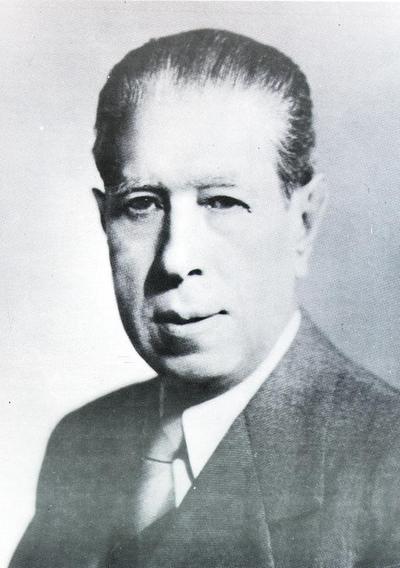Alcides Arguedas
 Alcides Arguedas[1†]
Alcides Arguedas[1†]Alcides Arguedas (July 15, 1879 in La Paz – May 6, 1946 in Chulumani) was a Bolivian writer, historian, and diplomat[1†]. His literary work, which had a profound influence on the Bolivian social thought in the first half of the twentieth century, addresses issues related to national identity, miscegenation, and indigenous affairs[1†]. He is well known for his novel “Wata Wara” (1904), which he rewrote and published as “Raza de bronce” (1919)[1†][2†].
Early Years and Education
Alcides Arguedas was born on July 15, 1879, in La Paz, Bolivia[1†]. He was the son of Fructuoso Arguedas and Sabina Díaz[1†][4†]. Arguedas’ early education took place at Ayacucho College[1†][4†]. His experiences during these formative years likely played a significant role in shaping his perspectives and intellectual interests.
Arguedas later pursued higher education at the Universidad Mayor de San Andrés, where he studied Law and Political Science, graduating in 1904[1†][4†]. His academic pursuits did not end there. Arguedas moved to Paris, where he studied sociology[1†][3†]. This period of his life was crucial as it equipped him with a sociological lens that he would later apply in his literary works and political career.
Arguedas’ education and upbringing in Bolivia, combined with his academic experiences in Paris, provided him with a unique perspective on the social and economic issues of his time. This perspective would become evident in his later works, which focused on the plight of South American Indians[1†][3†].
First Publication of His Main Works
Alcides Arguedas is recognized for his significant contributions to Bolivian literature. His works, which often explore the relationship between Bolivian society and its indigenous peoples, have had a profound influence on Bolivian social thought in the first half of the twentieth century[1†].
- Pueblo Enfermo (1909): This work, whose title translates to “A Sick People,” is one of Arguedas’ best-known works[1†][5†]. It is a reaction against the romantic idealization of the Native American and exposes the exploitation of Native Americans by the landowners[1†][5†].
- Raza de Bronce (1919): Arguedas’ most significant work, “Raza de Bronce,” or “Race of Bronze,” is a novel that sympathetically portrays the plight of the Aymara Indians living in the hostile yet beautiful landscape of the Andean altiplano[1†][6†]. The novel explores the social, economic, and ecological conditions facing the highland Indians, focusing as well on the racism and exploitation of white colonizers[1†][6†]. Written at a time of great political turbulence, “Raza de Bronce” is considered to be the first text in the indigenismo movement in Bolivia, and a notable work even in the wider context of Latin America[1†][6†]. It has been a standard text in the Bolivian school curriculum for many decades[1†][6†].
These works, among others, have cemented Arguedas’ place as one of Bolivia’s most influential writers[1†]. His exploration of themes related to national identity, miscegenation, and indigenous affairs continues to resonate in contemporary discussions[1†].
Personal Life
Alcides Arguedas was married to Laura Tapia Carro in 1910[1†][4†][7†]. The couple had three daughters[1†][4†][7†]. Unfortunately, Laura Tapia Carro passed away in 1935, leaving Arguedas a widower[1†][4†][7†].
In 1944, Arguedas spent some time in Buenos Aires due to illness[1†][4†]. During this period, he left Losada the definitive version of his significant work, Raza de bronce[1†][4†]. He returned to Bolivia the following year[1†][4†].
Arguedas passed away from leukemia in the town of Chulumani, a district of La Paz, on May 6, 1946, at the age of 66[1†][4†][7†].
Conclusion and Legacy
Alcides Arguedas left a profound legacy in Bolivian literature and social thought[1†][2†]. His work, which addresses issues related to national identity, miscegenation, and indigenous affairs, had a significant influence on Bolivian social thought in the first half of the 20th century[1†][2†][4†].
Arguedas is considered one of the initiators of realism in Bolivia, and of indigenismo in Latin America[1†][2†]. His most significant work, Raza de bronce (“Bronze Race”) (1919), is considered one of the most influential Bolivian literary works and a precursor of indigenism[1†][2†].
His novels, histories, and essays, though controversial because of his biting criticism of Bolivian reality, at the same time were praised for their candid presentation of the nation’s past[1†][2†]. His contact with some of the intellectuals of the Spanish “Generation of 1898,” mainly with Miguel de Unamuno and Ramiro de Maeztu, is key to an understanding of Arguedas’s view of Bolivian reality[1†][2†].
Arguedas passed away on May 6, 1946, in Chulumani, but his work continues to be a reference in Bolivian literature and social thought[1†][2†][4†].
Key Information
- Also Known As: Alcides Arguedas Díaz[1†]
- Born: July 15, 1879, La Paz, Bolivia[1†]
- Died: May 6, 1946, Chulumani, Bolivia[1†]
- Nationality: Bolivian[1†]
- Occupation: Writer, Politician, Diplomat[1†]
- Notable Works: Wata Wara (1904), Raza de bronce (1919)[1†]
- Notable Achievements: Arguedas is considered one of the initiators of realism in Bolivia, and of indigenismo in Latin America[1†][2†]. His work had a profound influence on Bolivian social thought in the first half of the 20th century[1†].
References and Citations:
- Wikipedia (English) - Alcides Arguedas [website] - link
- Encyclopedia.com - Arguedas, Alcides (1879–1946) [website] - link
- Britannica - Alcides Arguedas: Bolivian author [website] - link
- AcademiaLab - Alcides Arguedas [website] - link
- Encyclopedia.com - Arguedas, Alcides [website] - link
- Wikipedia (English) - Raza de Bronce [website] - link
- Kiddle Encyclopedia - Alcides Arguedas Facts for Kids [website] - link
Text is available under the Creative Commons Attribution-ShareAlike License 4.0; additional terms may apply.
Ondertexts® is a registered trademark of Ondertexts Foundation, a non-profit organization.